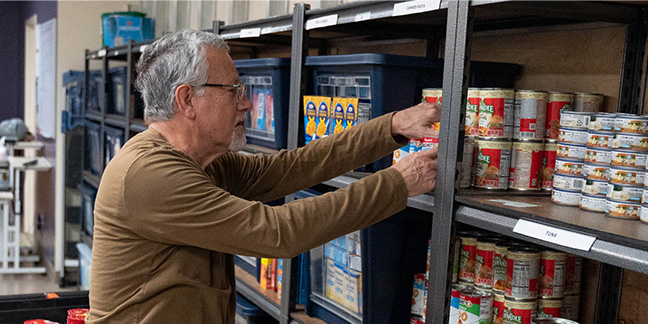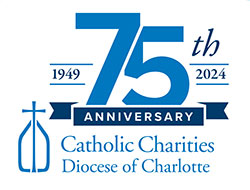 Volunteers are crucial to the weekly operations of Catholic Charities’ three food pantries in Charlotte (pictured), Asheville and Winston-Salem. A community garden at Catholic Charities’ Winston-Salem location provides fresh vegetables during the growing season to augment the grocery staples it distributes to people in need. (File | Catholic News Herald) EDITOR’S NOTE: Catholic Charities Diocese of Charlotte is highlighting the seven themes of Catholic Social Teaching as part of its year-long 75th anniversary celebration. This week, the focus is on “Life and Dignity of the Human Person.” The Church proclaims that human life is sacred and that the dignity of the human person is the foundation of a moral vision for society. This belief is the foundation of all the principles of our social teaching.
Volunteers are crucial to the weekly operations of Catholic Charities’ three food pantries in Charlotte (pictured), Asheville and Winston-Salem. A community garden at Catholic Charities’ Winston-Salem location provides fresh vegetables during the growing season to augment the grocery staples it distributes to people in need. (File | Catholic News Herald) EDITOR’S NOTE: Catholic Charities Diocese of Charlotte is highlighting the seven themes of Catholic Social Teaching as part of its year-long 75th anniversary celebration. This week, the focus is on “Life and Dignity of the Human Person.” The Church proclaims that human life is sacred and that the dignity of the human person is the foundation of a moral vision for society. This belief is the foundation of all the principles of our social teaching.
An estimated 2.8 billion people – approximately one-third of the global population – struggle to get enough food to sustain themselves each day.
Of that number, 1.2 million people are North Carolinians, including about 394,000 children – about 10.9% of the population, according to state health officials.
The Church teaches that the right to food and water that is safe, nutritious, affordable and accessible is a right inherent to everyone everywhere. In his annual message for World Food Day on Oct. 16, Pope Francis reiterated this basic human right, saying that it is important to uphold the right to food if we are to uphold the life and dignity of every person.
Catholic Charities Diocese of Charlotte strives to protect this rig=ht by working to alleviate hunger in several ways.
Through its food pantries and community gardens throughout the diocese, as well as its “Transition Out of Poverty” program, Catholic Charities not only gives groceries to get people through the week, but provides help over the long term to improve their overall food security.
In this past quarter (July to September), food pantries in Charlotte, Winston-Salem and Asheville have provided emergency food aid to 1,215 families, comprised of 2,496 children and 3,374 adults. Besides non-perishable food items, the pantries also provide essentials not covered by government assistance, such as soap and other toiletries.
“Catholic Charities believes that healthy, nutritious food should be available to everyone,” said Social Concerns and Advocacy Director Joe Purello. “Food pantries and food banks are a critical lifeline that enables families to fill gaps in their budgets and address the challenges of food insecurity.”
Community gardens in Asheville and Winston-Salem also provide fresh vegetables – including tomatoes, okra, peppers, beans, cucumbers, watermelons, even a few flowers – to augment the grocery staples that Catholic Charities’ food pantries distribute to families in need.
These volunteer-driven efforts are a crucial part of Catholic Charities’ day-to-day efforts to reduce hunger in our community.
Elsa and Hernan Sabio, who have volunteered at Winston-Salem’s food pantry for a decade and at its community garden since its inception, appreciate how the extra effort helps neighbors in need.
“We were aware that some of the population that we serve in the food pantry may not have access to the more naturally grown foods, so we thought if something can be grown and be made available fresh, too, that would be great,” Hernan Sabio told the Catholic News Herald. “That was the seed of how it got started, and it made a lot of sense to us.”
Added Elsa Sabio, “It’s a good way of providing food to those who need it, but it’s more than just the produce. It’s from our garden. We have put our love into growing it.”
Beyond immediate food assistance, Catholic Charities’ “Transition Out of Poverty” program offers one-on-one attention and wrap-around services to overcome obstacles that trap people in the cycle of poverty – whether that is the lack of educational opportunities, a driver’s license, affordable healthcare, or safe and affordable housing. Trained Catholic Charities staff guide individuals to map out a custom, long-term plan, then mentor and accompany them each step of the way, up to a year for most people.
In the past year, 34 households were served through this intensive, case management-based TOP program.
Another way that the diocese works to alleviate hunger is through its participation in Catholic Relief Services’ Rice Bowl program each Lent.
Catholic Relief Services, or CRS for short, is the international humanitarian organization of the U.S. Conference of Catholic Bishops. CRS works to ensure the “right for foods” both at home and abroad, designating a great deal of its resources to providing food aid and promoting agricultural development in over 40 countries where CRS has operations.
Parishes that participate in the CRS Lenten Program each year help to provide the funds needed by CRS to fight hunger around the world. And 25% of the funds help fund anti-poverty efforts in the Charlotte diocese, through CRS Mini-Grants.
In the past year $14,000 in grant funds went to projects in Albemarle, Arden, Asheville, Belmont, Charlotte, Linville, North Wilkesboro and Salisbury. Go to www.ccdoc.org/cchdcrs to find information on Catholic Charities CRS Mini-Grants Program, including how to apply for grants (email submission deadline is Nov. 15).
“These grants of up to $1,000 provide Catholic parishes with extra funds to help those struggling to make ends meet in their local communities,” Purello said. “Providing food and other necessities to our brothers and sisters in need is a requirement of our faith (Mt 25:37). Throughout our diocese, parishes and Catholic Charities’ offices are blessed with generous donations and volunteers who put their faith into action through the works of mercy.”
— David Long and Patricia L. Guilfoyle
 Get involved with Catholic Charities
Get involved with Catholic Charities
Join Catholic Charities in its mission to help those in need and spread the love of Christ:
Learn More: Visit www.ccdoc.org to discover how Catholic Charities is making a difference in the Diocese of Charlotte.
Donate: Consider donating funds to Catholic Charities at www.ccdoc.org/donate. Get details on how to donate food at www.ccdoc.org/donate-grocery-items.
Volunteer: Make a direct impact by volunteering with Catholic Charities’ food pantries in Asheville, Charlotte or Winston-Salem. Learn more about volunteer opportunities at www.ccdoc.org/volunteer or call 704-370-3262 (Charlotte), 828-255-0146 (Asheville), or 336-727-0705 (Winston-Salem). Note: The Asheville Food Pantry is temporarily closed in the aftermath of Hurricane Helene.



 Get involved with Catholic Charities
Get involved with Catholic Charities